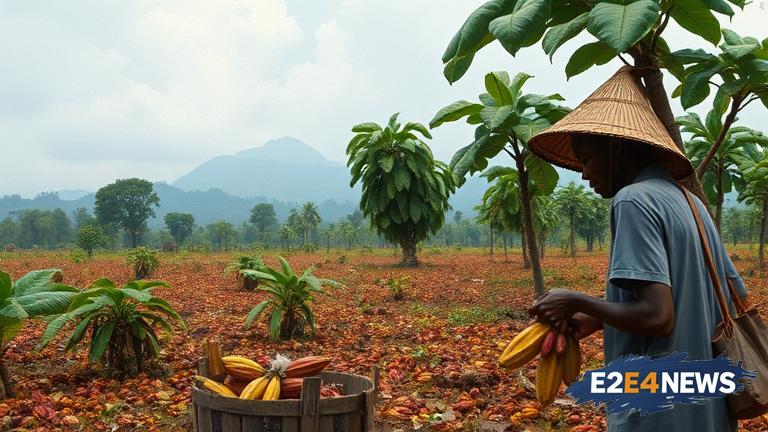Cocoa farmers in Ivory Coast are growing increasingly concerned about the effects of cold weather and scant rains on their crops. The country, which is the world’s largest producer of cocoa, is experiencing unusual weather patterns that are threatening the livelihoods of thousands of farmers. The cold weather, which is expected to continue for several more weeks, has already started to affect the growth of cocoa pods, leading to a decrease in yields. Farmers are worried that if the weather conditions do not improve, they will not be able to meet the demand for cocoa, which could have a significant impact on the country’s economy. Ivory Coast produces over 30% of the world’s cocoa, and the crop is a major source of income for many farmers. The country’s cocoa industry is worth billions of dollars, and any disruption to production could have far-reaching consequences. The farmers are calling on the government to provide support and assistance to help them mitigate the effects of the cold weather and scant rains. They are also urging the government to invest in irrigation systems and other technologies that could help to improve crop yields and reduce the impact of weather-related shocks. The Ivory Coast government has announced plans to provide financial support to farmers affected by the weather, but many farmers are skeptical about the effectiveness of these measures. The government has also launched a program to distribute seeds and fertilizers to farmers, but the distribution process has been slow, and many farmers have not yet received the support they need. The cold weather and scant rains are not only affecting cocoa farmers but also other farmers who grow crops such as coffee, cashews, and cotton. The weather conditions are also having an impact on the country’s food security, as many farmers are struggling to grow enough food to feed their families. The Ivory Coast government is working with international organizations to develop strategies to help farmers adapt to the changing weather patterns. The government is also investing in research and development to improve the resilience of cocoa crops to weather-related shocks. Despite these efforts, many farmers remain concerned about the future of the cocoa industry in Ivory Coast. The country’s cocoa production has been declining in recent years due to a combination of factors, including weather-related shocks, pests, and diseases. The decline in cocoa production has had a significant impact on the country’s economy, and the government is under pressure to find solutions to the crisis. The Ivory Coast government has announced plans to increase cocoa production by 20% over the next five years, but many farmers are skeptical about the feasibility of this target. The government is also working to improve the livelihoods of cocoa farmers by providing them with training and support to improve their farming practices. The Ivory Coast government is committed to supporting the cocoa industry, which is a vital part of the country’s economy. The government is working with farmers, traders, and other stakeholders to develop a comprehensive strategy to improve the sustainability of the cocoa industry. The strategy includes measures to improve crop yields, reduce the impact of weather-related shocks, and increase the income of cocoa farmers. The Ivory Coast government is also working to promote the country’s cocoa industry internationally, by participating in trade fairs and other events. The government is also working to improve the quality of cocoa beans produced in the country, by providing training and support to farmers on best practices. The Ivory Coast government is committed to ensuring that the cocoa industry is sustainable and profitable for farmers, and is working to address the challenges facing the industry. The government is also working to improve the livelihoods of women and children in cocoa-growing communities, by providing them with access to education and healthcare. The Ivory Coast government is working with international organizations to develop programs to support women and children in cocoa-growing communities. The programs include measures to improve access to education and healthcare, as well as initiatives to promote women’s empowerment and child protection. The Ivory Coast government is committed to ensuring that the cocoa industry is a positive force for development in the country, and is working to address the social and environmental challenges facing the industry.





